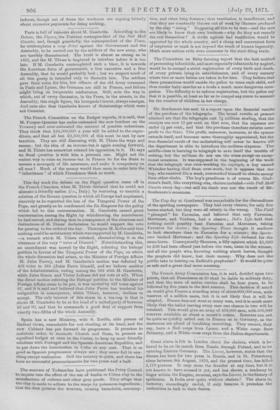This day week the debate on the Papal question came
off in the French Chamber, when M. Thiers declared that he could not alienate a friendly nation (i.e., Italy) by venturing to unsettle a solution of the Roman question in which all Europe had acquiesced, sincerely as he regretted the loss of the Temporal Power of the Pope, and greatly as he condemned the Ex-Emperor for the policy which led to this consummation. M. Gambetta caused great consternation among the Right by withdrawing the amendment he had moved, and stating that in consequence of the clearness and distinctness of M. Thiers' declaration he would support the vote for passing to the order of the day. Thereupon M. Keller said that nothing could be satisfactory which was supported by M. Gambetta, —a remark which M. Thiers rebuked, characterizing it as the utterance of the very "voice of Discord." Notwithstanding this, an amendment was moved by the Right, referring the bishops' petition in favour of the Temporal Power of the Pope, on which the whole discussion had arisen, to the Minister of Foreign Affairs M. Jules Fevre), and M. Gambetta's motion was defeated by 403 votes to 264 (Jules Fevre himself, and we believe another of the Administration, voting among the 204 with M. Gambetta, while Jules Simon and Victor Lefranc did not vote at all). When the direct motion referring the Bishops' petition to the Minister of Foreign Affairs came to be put, it was carried by 447 votes against 87, and it is said and believed that Jules Fevre has tendered his resignation in consequence, which Thiers, however, declines to accept. The only interest of this storm in a tea-cup is that it shows M. Gambetta to be at the head of a united party of between 80 and 90, and that he commands a good deal of support from exactly two-fifths of the whole Assembly.
































 Previous page
Previous page